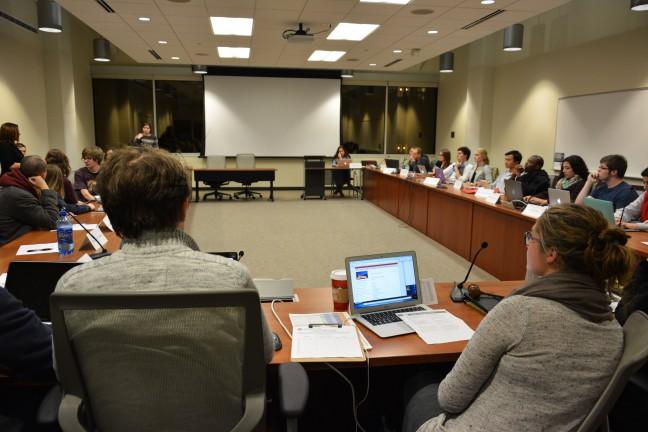After receiving an increase in university funding, advocates from Rape Crisis Center, End Violence on Campus and Promoting Awareness, Victim Empowerment programs spoke to Associated Students of Madison this week to attest to their importance on University of Wisconsin campus.
Elena Santi, the volunteer coordinator for PAVE on campus, spoke in open forum about the services PAVE and RCC give on campus, such as referrals and a 24-hour hotline for victims.
“I think it’s so important that we increase our capacity to help survivors and students on campus when it comes to these issues,” Santi said.
Jamie Sathasivam, program coordinator for RCC, spoke about the importance of the program and the reason for an increase in funding from ASM from $60,000 to $100,000.
“For us, advocacy provides a person to go out and physically sit with someone and support someone,” Sathasivam said.
One in five students on any college campus is sexually assaulted, she said.
Jamie Temple, a member of University Health Service’s EVOC coordinating council, spoke about EVOC and the ways it focuses on campus and community advocates so victims have a choice as to who they are most comfortable speaking with.
“Having an advocate present for a survivor is something that helps them … There’s this idea that there can never be too many services for survivors,” Temple said.
While EVOC cannot hold a 24-hour hotline, they can refer victims to the RCC at any time. Having someone to talk to is the most important thing, Temple said.
There is evidence pointing to stronger law enforcement and reports of assault with more accessible advocacy, Temple said. When someone is going through one of the hardest things in their life, it’s good to have someone fighting for them, she said.
“I think the message is if they are believed and they are supported, then that is a really wonderful shift that is happening on campuses and they are still in the process of making that change,” Temple said.
However, Temple said an advocate’s role is not to ask a survivor what happened to them or physically how they’re doing; their job is to support them and talk to them about whatever will help them move on, Temple said.
The final part of the meeting was devoted to discussing each part of the budget in order to ensure everyone supported any increases or decreases in budgets, from a range of areas including office supplies and clubs.
There will be an increase in the budget student hourly wages from $10,000 t0 $13,000 for students working for ASM, due to an increase in hourly wage, as well as an increase in hours.
Budgets for clubs to travel will be increased from $160,000 to $200,000. Clubs have been using all of their travel money each year, causing ASM to decide to allot more for them.
Every increase or decrease of funds within the budget was passed.
Brad Peltin, Legislative Affairs vice chair, spoke about the success of the Get Out and Vote campaign, regardless of Voter ID laws making it difficult for students to register.
“Despite all the obstacles and uncertainty we faced throughout the campaign, we never strayed from our goals to increase student participation in the electoral process,” Peltin said.














